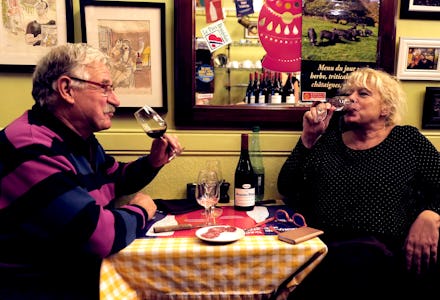Restaurants are allegedly safe spaces, but in Trump's America, that’s no longer the case

No shirt, no service? How about: no harassment, no service?
Last Friday night outside the TriBeCa Wolfgang's Steakhouse in New York City, three male customers told three women walking by that they would grab them by their pussies, one of the women, Anna Childs, said in an email.
The women — Childs, Shelley Fort and Lindsay Means — alerted staff inside about the incident.
"The staff members then told us, directly, that these were 'nice guys, regulars at the restaurant,' and that 'ladies, you should really just calm down,'" Childs said. She said the restaurant offered them drinks on the house, but the women turned it down, quickly exiting after it looked like the men were going to approach them and physically hurt them.
"The restaurant initially defended the harassers, which was absolutely inappropriate," Fort said in an email. The women tried to reach out to the restaurant on Twitter and Facebook, but didn't get a response until they called the restaurant Sunday night. A manager apologized to the guests and for the employee who was "most vocally defending them," Fort said.
In a phone interview, Amir Ibahim, a manager at Wolfgang's Steakhouse in Tribeca for 10 years, said the employee who had defended the customers has been fired and that the restaurant would have a meeting with its public relations team.
"If [the women] talked to the manager, the whole situation would be totally different," Ibahim said, adding that if he were involved, he would have called the police. Ibahim said restaurant staffers will be attending a seminar about best practices for responding to these types of issues in the future.
Violence in and around restaurants
In the wake of Donald Trump's presidential victory last week, the country is tense. By some estimates, more than 300 instances of hateful harassment have occurred since election night. Restaurants, which are usually regarded as nonpolitical spaces, have seen their fair share.
On Saturday, one Trump supporter punched a woman in the face at a restaurant in Brooklyn, New York, Mic previously reported. The woman had been discussing her political views to her dining partner. Near JC's Kitchen, a restaurant in Durham, North Carolina, someone painted a racist message that read, "Black lives don't matter and neither does your vote," CNN reported.
At a Mexican restaurant in Walpole, Massachusetts, a man named Richard Kadesh posted a photo of a Trump flag with the caption, "They're paying for the wall!" the Boston Globe reported. In Michigan, instead of receiving a tip, a server at a TGI Fridays was left hateful words along with the signature "#PresidentTrump," according to WWMT.
"To say you're surprised at the outcome erases the entirety of our experience as minorities" - Shelley Fort
For some, these hateful acts are nothing new.
These reported violent acts may have seemingly surged, but Fort, one of the women in the Wolfgang's incident, said they shouldn't be described as shocking. "My little mixed-race self and my ancestors before me have experienced sexism, bigotry and racism for centuries," Fort said. "So to say you're surprised at the outcome erases the entirety of our experience as minorities."
Even before the election, diners have faced discrimination from fellow customers. Mic's Sarah Harvard, who is a Muslim woman of color, tweeted in September that when she was dining at Ground Central Coffee, a New York City coffee shop, a woman told her Trump would kick her out. Harvard tweeted that none of the other people in the coffee shop said anything during or after the incident.
While managers and business owners may need to take responsibility for hateful acts that occur on their premises, they may sometimes hold the same biases as the assaulter, rendering them unhelpful for a victim. In September, a Minnesota restaurant owner posted a sign that read "Muslims get out." A month earlier, an Italian restaurant in New Mexico faced backlash for selling "Black Olives Matter" merchandise.
Fort suggested that restaurants should be prepared to act when hate-fueled incidents occur. "If a restaurant chooses not to take responsibility for their guests' actions, they should also be prepared for a backlash from members of the community who condemn toxic behavior," Fort said. As of this article's publication on Thursday, the Wolfgang's Steakhouse Yelp page was undergoing an "active cleanup" from the Yelp team — signaling that people flooded the page with positive or negative reviews based on events in the news.
"Management is always supposed to intervene if workers or patrons feel unsafe," Saru Jayaraman, co-founder and co-director of Restaurant Opportunities Center United, or ROC United, said in an email. ROC United works to improve wages and working conditions for restaurant employees nationwide. "We are currently working with both employers and workers to create support for everyone in the industry during this time, so we will have more to say shortly," Jayaraman said.
Andrew Rigie, executive director of the New York City Hospitality Alliance, suggested Trump's America is business as usual for restaurants. He emailed the following statement to Mic:
"People should go out to eat, drink and enjoy themselves and if they are uncomfortable, they should speak with a restaurant's manager who can access and address the situation, however, if there's suspicious activity or behavior, they should report it to police, no different than they would have before the election."
Restaurants are clearly not the only places where hateful acts can occur, but in the past they've been seen as private spaces where customers could expect to enjoy a meal in peace. The reality: They weren't safe for all before. Here's hoping restaurants keep a closer eye on their customers' well-being.